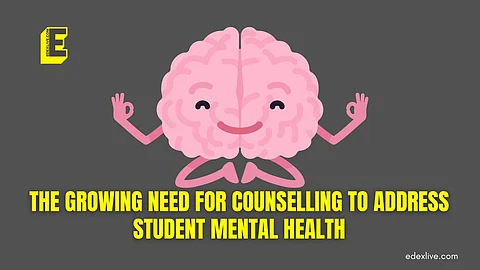

The rising number of student suicides in India is a grave concern that calls for immediate action.
Recently, at the Annual IC3 Conference & Expo 2024, the Student Suicides: An Epidemic Sweeping India Vol 2 report was launched, highlighting disturbing trends. The report revealed that student suicides are now exceeding those of farmers in the country, growing at twice the rate of overall suicides.
These findings underscore the immense pressure faced by students and the urgent need for comprehensive support systems, particularly through effective counselling, within educational institutions.
In a country where education is often seen as the primary pathway to success, students are grappling with intense academic pressure, career expectations, and societal demands. The path to a secure future is paved with high-stakes exams, fierce competition, and the fear of failure.
It’s not uncommon for students to feel overwhelmed by the weight of these expectations, leading to anxiety, depression, and, in some tragic cases, thoughts of suicide. This pressure is exacerbated by early and pervasive comparisons among students, driven by a growing middle class and an increasingly aspirational society.
From an early age, children are often compared on various fronts — be it their academic performance, social skills, or even their personal traits. These comparisons eventually evolve into acute competition, which, when left unchecked, can manifest as self-inflicted harm, including the tragic decision to take one’s own life.
The recently launched report clearly indicates that these mental health challenges are escalating, making it essential for schools, colleges, and families to prioritise students' emotional well-being alongside their academic achievements.
Counselling
Counselling, often overlooked, plays a crucial role in supporting students through their educational journeys. Counselling is not just about guiding students towards a suitable career path; it's about providing them with the tools to handle stress, make informed decisions, and align their life choices with their personal values and interests.
Effective counselling helps students understand their strengths and weaknesses, explore various life options, and set realistic goals. More importantly, it provides a safe space for students to express their concerns and anxieties, offering them emotional support and understanding.
The unhealthy competition fostered by societal comparisons only intensifies these challenges. This environment perpetuates a cycle where individuals are judged by their accomplishments, often leading to the belief that those who do not meet certain benchmarks are less worthy. Such attitudes can be incredibly damaging, particularly for young people who are still in the process of forming their identities.
When students are encouraged to pursue paths that resonate with their passions, they are more likely to find fulfilment and success. This alignment not only reduces the pressure of conforming to societal expectations but also contributes to better mental health outcomes. It empowers students to take control of their future, knowing that their choices are based on their authentic selves rather than external pressures.
Schools and colleges must take a proactive approach to implement comprehensive counselling programmes. This involves training teachers to recognise early signs of distress, making counselling services accessible to all students, and fostering an environment where seeking help is encouraged and destigmatised. Parents also play a vital role in this process.
They should be open to conversations about mental health, listen to their children’s concerns without judgment, and support their interests and aspirations, even if they deviate from traditional paths.
Not a one-time solution
Counselling is not a one-time solution but a continuous process of guidance and support. It should begin early in a student’s life, helping them navigate the complexities of growing up and preparing them for future challenges. By embedding counselling into the education system, we can create a supportive network that addresses not only academic needs but also emotional and psychological well-being.
The alarming statistics on student suicides serve as a wake-up call for educators, parents, and policymakers. The need for effective counselling is more critical than ever.
By prioritising mental health and providing robust counselling services, we can help students manage the pressures they face, make informed decisions about their future, and lead fulfilling lives.
Together, we can create an educational environment where every student feels valued, supported, and empowered to achieve their true potential.
(The column is written by Ganesh Kohli, Founder, IC3 Movement. All views expressed are his own.)
